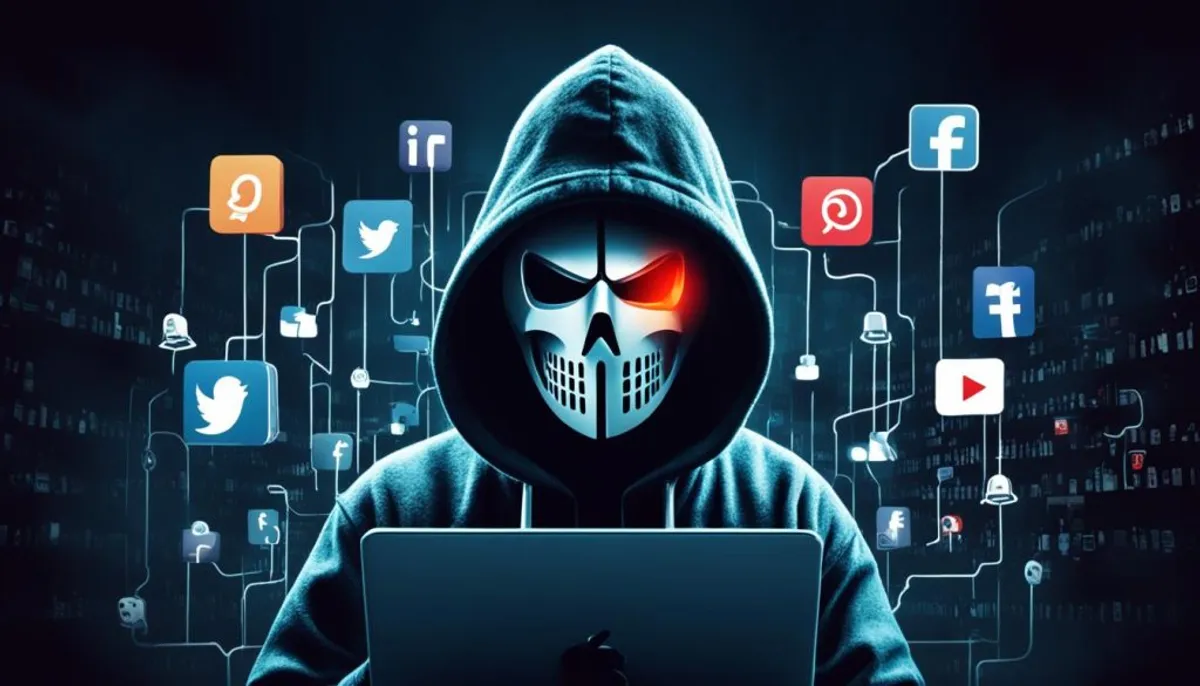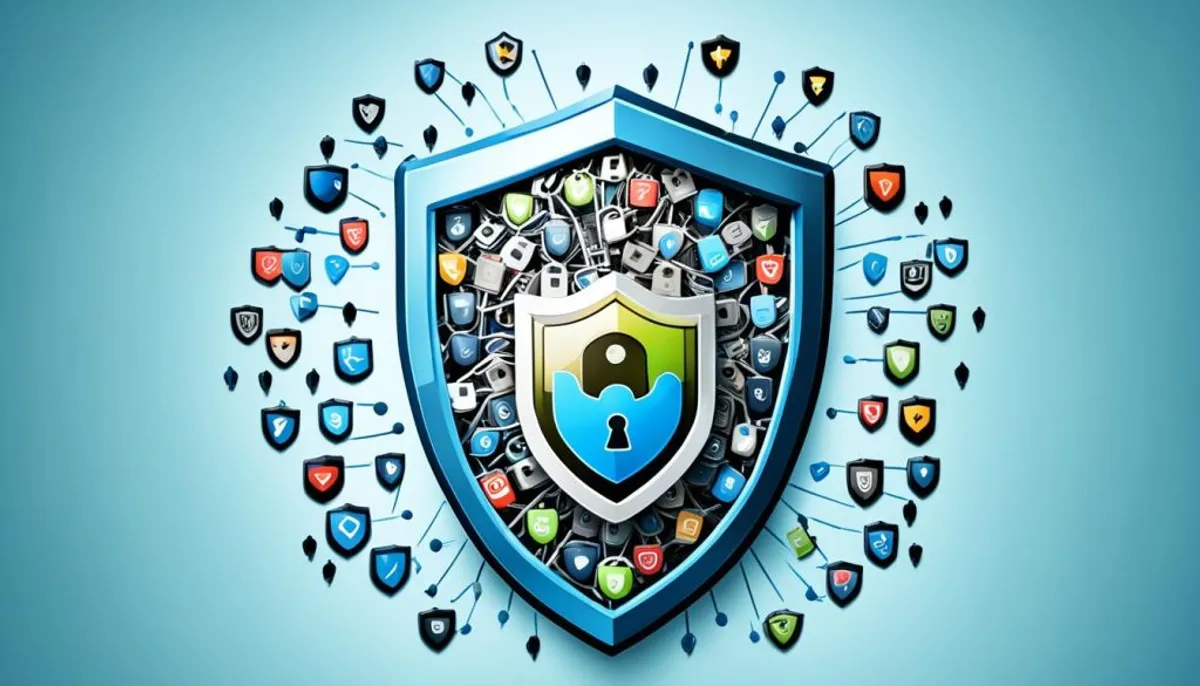Social media is a big part of our lives today, making it easy to connect with others. But, it also brings hidden dangers, like the risk of our personal info being stolen. It’s important to know and deal with these risks to keep our online lives safe.

Social media has changed how we talk, share, and connect with people. It’s fun and exciting, but it also means our personal data is at risk. Things like identity theft and data breaches are real dangers we face online. We need to be careful to protect our digital lives.
Understanding the dangers of social media is key to staying safe online. By learning about common cyber threats, we can protect our online privacy. This way, we can keep our personal info safe from those who shouldn’t have it.
Introduction: The Double-Edged Sword of Social Media
The rise of social media has changed how we connect and share info. It brings us closer but also brings cyber threats that can harm our privacy and safety online, making protecting personal information more crucial than ever.
The Rise of Social Media and Its Pervasive Influence
In the last ten years, social media has become a big part of our lives. We use it to share with friends, engage with brands, and connect with communities. As we look forward to the future, social media apps 2023 are expected to further change how we share and get information.
The Convenience and Excitement of Connecting Online
Being able to stay in touch with people, find new interests, and join a global community is what draws us to social media. It’s easy to get a lot of information and feel connected right away.
The Hidden Dangers: Vulnerability to Cyber Threats
But, what makes social media great can also put us at risk. We face threats like phishing attacks, identity theft, and data breaches. These threats can use our personal info and online actions.
As we use social media, finding a balance is key. We need to enjoy its benefits while keeping our online safety in mind. Knowing the risks and protecting personal information helps us use social media safely.
Common Cyber Threats on Social Media Platforms
Social media is a hot spot for cybercriminals today. They target users with phishing attacks, identity theft, and data breaches. It’s crucial for users to protect their info to avoid financial loss, legal issues, and damage to their reputation.
Phishing Attacks: Tricking Users into Revealing Sensitive Data
Phishing attacks are a common way for cybercriminals to get sensitive info. They might create fake profiles or send fake messages that look real. This tricks users into sharing things like passwords or financial details.
Identity Theft: Exploiting Personal Information for Financial Gain
Cybercriminals use social media to steal identities. They combine info from profiles like names and contact details. Then, they create fake accounts and use them for fraud, like making fake purchases or taking out loans in someone else’s name.
Data Breaches: Compromising User Data on a Large Scale
Social media is also at risk of big data breaches. In these, hackers get into user data, including messages and photos. This can lead to more identity theft and financial fraud for millions of users. The rise of social media use has made it easier for cybercriminals to exploit vulnerabilities and access sensitive information.
| Cyber Threat | Description | Potential Consequences |
|---|---|---|
| Phishing Attacks | Tricking users into revealing sensitive data, such as login credentials and financial information | Financial loss, identity theft, and legal troubles |
| Identity Theft | Exploiting personal information from social media to create fake accounts and make fraudulent purchases | Financial loss, legal troubles, and reputational damage |
| Data Breaches | Large-scale compromises of user data, including private messages, photos, and other sensitive information | Identity theft, financial fraud, and widespread exposure of personal details |
It’s important to stay alert and use strong security to fight these cyber threats. This helps protect your info on social media.

The Impact of Cyber Threats on Personal Information
In today’s digital world, getting hit by cyber threats on social media can be really bad. Identity theft can cause big financial losses, hurt your credit score, and even lead to legal issues if the stolen info is used for crime.
Data breaches can affect a lot of people, revealing sensitive info of thousands or even millions. This loss of trust in companies can make victims more open to more attacks and scams. Also, having your account hacked can lead to privacy violations and reputational damage. Hackers might use your account to send spam, spread malware, or commit fraud. To combat these issues, it is essential to explore effective online harassment solutions that can protect users from further threats.
Financial Loss and Legal Troubles from Identity Theft
Identity theft can bring big problems. Victims might face:
- Fraudulent charges on accounts or new accounts opened in their name, causing financial loss
- Damage to their credit score, making it hard to get loans, mortgages, or jobs
- Legal issues if the stolen identity is used for criminal acts, like tax fraud or illegal transactions
Widespread Exposure of Sensitive Data in Data Breaches
Data breaches can affect a lot of people, exposing personal info of thousands or millions. Protecting personal information is crucial, as the effects of such big data leaks are:
- Loss of trust in the companies hit, as people doubt the safety of their info
- Increased risk of more attacks and scams, as the stolen data can be used for phishing or other bad stuff
- Long-term issues, as the stolen data can be sold, traded, or used for identity theft and crimes for years
Privacy Violations and Reputational Damage from Compromised Accounts
When social media accounts get hacked, the effects can be big, including a significant impact on self-image. This leads to:
- Privacy violations, as hackers can access and misuse personal info in the account
- Reputational damage, as the hacked account might be used for spam, malware, or fraud, hurting your online reputation
Steps to Safeguard Your Personal Information on Social Media
When you’re online, it’s key to keep your personal info safe. Here are some steps to help you protect your data:
- Check and change your privacy settings often. This way, you control who sees your info.
- Think before you post. Don’t share where you live, your contact info, or personal photos. It can put you at risk.
- Don’t share too much. Keep your life private to avoid identity theft or other dangers.
- Be careful with friend requests. Don’t accept from people you don’t know. They might be trying to steal your info.
- Watch out for phishing scams. Be suspicious of messages or links from unknown senders. They could be trying to trick you.
By following these steps, you can lower the risk of cyber threats and keep your online identity safe. Learning about online safety helps everyone stay secure on social media, especially when using social media apps for adults.
| Platform | Privacy Setting Recommendation |
|---|---|
| Set posts to “Friends” or “Friends except…” to control visibility | |
| Make your account private to limit who can view your tweets | |
| Switch to a private account to approve follow requests | |
| Customize your public profile to share only the information you’re comfortable with |

Protecting Yourself: Strategies for Safe Social Media Use
In today’s digital world, keeping your personal info safe on social media is key. By using a few smart steps, you can lower risks and have a safer online time.
Privacy Settings and Account Security Measures
Control your social media privacy settings. Check and change how visible your posts and personal info are often. Make sure your accounts are set to the highest privacy level to keep your data safe.
Recognizing and Avoiding Social Engineering Attacks
Watch out for social engineering attacks, where hackers try to get you to share sensitive info. Be careful with any strange messages, links, or requests, even if they seem legit. Always check if messages are real before you act on them. Additionally, be aware of phishing scams that can trick you into revealing personal information.
The Importance of Strong and Unique Passwords
Keeping your passwords safe is very important. Don’t use easy-to-guess passwords. Instead, make strong, unique passwords for each social media account. Think about using a password manager to keep your passwords safe.
Two-Factor Authentication for Added Security
Turn on two-factor authentication (2FA) for your social media. This adds an extra step, like a code to your phone, to get into your account. 2FA makes your info much safer.
Regularly Reviewing and Updating Privacy Settings
Always check and update your social media privacy settings. Social media changes often, so it’s key to keep up. This helps keep your info safe.
Educating Yourself and Others About Online Safety
Learn about online safety and share what you know with others. Encourage your friends to be careful and protect their online presence from phishing scams. We can all help make the internet safer together.
| Strategy | Description |
|---|---|
| Privacy Settings | Review and adjust the visibility of your posts, personal details, and other sensitive information on social media platforms. |
| Avoiding Social Engineering | Be cautious of suspicious messages, links, or requests, and verify the authenticity of any communication before engaging. |
| Strong Passwords | Create strong, unique passwords for each of your social media accounts, and consider using a password manager. |
| Two-Factor Authentication | Enable two-factor authentication on your social media accounts to add an extra layer of security. |
| Regular Privacy Reviews | Regularly review and update your social media privacy settings to ensure your personal data remains secure. |
| Online Safety Education | Educate yourself and others about online safety best practices to create a safer digital environment. |
Conclusion: Taking Control of Your Online Presence
Social media has changed how we connect and share info. But, it also brings risks. By learning about these dangers and following the steps in this article, including some effective youtube seo tips, you can protect your online life. Make sure to check and change your privacy settings, use two-factor authentication, and keep your passwords safe.
Be careful of social engineering attacks and keep an eye on your privacy settings. Learn about online safety and teach others to make the internet safer for all. By focusing on your online security, you can move through the digital world with confidence. You’ll know you’ve done everything you can to keep your personal info safe from cyber threats.
It doesn’t matter if you’re a big social media fan or just getting started online. It’s important to take charge of your online life. By staying updated and following safe social media practices, you can enjoy the good parts of these platforms. At the same time, you’ll lower the chance of getting caught in cyber traps.
RelatedRelated articles



